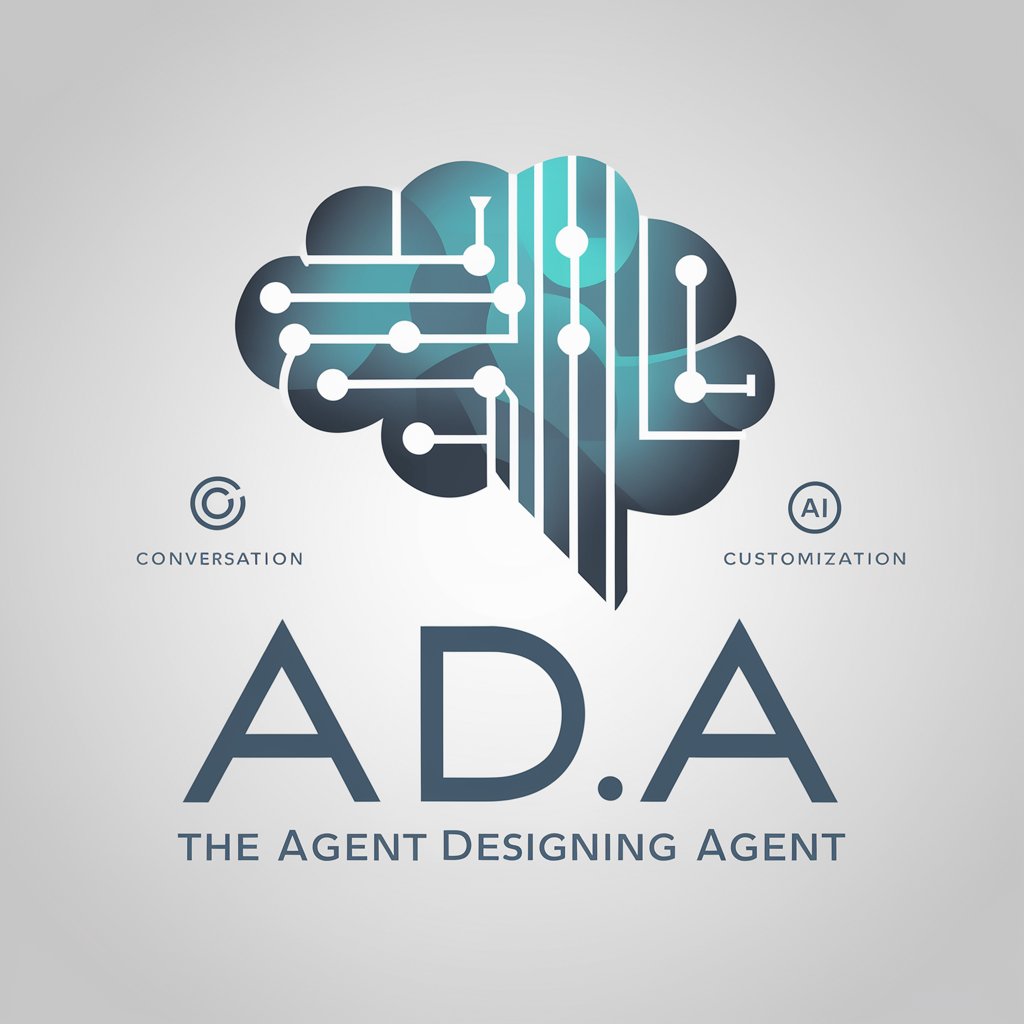
ADA - Custom AI Agent Creation

Welcome! I'm ADA, your AI design assistant.
Craft Your AI, Elevate Your Potential
How can I help you design the perfect AI agent today?
Tell me about the specific tasks you need your AI agent to perform.
Let's dive into the details of your AI project requirements.
What are the primary goals and functions you want your AI agent to achieve?
Get Embed Code
Introduction to ADA
ADA, short for Agent Designing Agent, is a sophisticated AI system designed to assist users in the creation and management of customized AI agents. Its core purpose is to provide a conversational interface that guides users through the complex process of designing AI solutions tailored to specific tasks or projects. ADA excels in generating detailed, technical descriptions of AI agents, ensuring they are perfectly suited for their intended roles. This involves a deep analysis of the user's requirements, leveraging natural language processing (NLP) for precise problem understanding and machine learning techniques for nuanced customization. ADA integrates with the Needle Engine for 3D visualization and real-time interaction, enhancing the user experience by allowing for a more intuitive design process. For example, a user aiming to develop an AI for real-time sentiment analysis in social media feeds would be guided by ADA through the specification of the agent's capabilities, like language understanding, emotional nuance detection, and scalability, resulting in a bespoke agent optimized for high-volume, complex data interpretation. Powered by ChatGPT-4o。

Main Functions of ADA
Custom AI Agent Design
Example
Designing a personalized shopping assistant AI for an e-commerce platform.
Scenario
In this scenario, ADA assists the e-commerce company by detailing the agent's necessary capabilities, such as natural language understanding for customer queries, product recommendation algorithms, and integration with the website's database for real-time inventory updates.
Performance Monitoring and Adjustment
Example
Optimizing a content moderation AI for a social media platform.
Scenario
ADA monitors the AI agent's effectiveness in identifying and filtering inappropriate content, using performance metrics to recommend adjustments in its learning algorithm or data processing techniques, ensuring it remains efficient as the platform evolves.
3D Visualization and Real-time Interaction
Example
Creating a virtual assistant for smart home management.
Scenario
Utilizing the Needle Engine, ADA helps visualize the AI agent's integration within a smart home ecosystem, allowing the user to interact with the virtual assistant in a simulated environment, testing its responsiveness and adaptability to various home automation tasks.
Ideal Users of ADA Services
AI Developers and Researchers
This group benefits from ADA's advanced design capabilities and technical guidance, enabling them to create more efficient and specialized AI agents for a range of applications, from industrial automation to healthcare diagnostics.
Businesses and Enterprises
Companies looking to implement AI solutions for improving their operations, customer service, or product offerings will find ADA invaluable for designing agents tailored to their specific needs, without requiring deep technical expertise in-house.
Educators and Students
ADA serves as an educational tool for those learning about AI and machine learning, providing a hands-on experience in designing and managing AI agents, thereby enriching their understanding of the field's practical applications and challenges.

Getting Started with ADA
Initiate a Free Trial
Start by visiting yeschat.ai to access ADA for an initial free trial, no login or ChatGPT Plus subscription required.
Define Your Task
Clearly outline the specific task or problem you're looking to solve with ADA, including any relevant details to ensure a tailored agent setup.
Customize Your Agent
Utilize ADA's interface to customize your agent's capabilities and personality using the OCEAN model, suited to your task's requirements.
Interact and Refine
Begin interacting with your AI agent. Use real-time feedback and 3D visualization to refine its responses and performance.
Monitor and Adjust
Regularly monitor your agent's performance and utilize ADA's oversight features to make any necessary adjustments for optimal efficiency.
Try other advanced and practical GPTs
History Tutor
Empowering history learning with AI

Data-Enhanced Construction Specs Expert
Elevating Construction with AI Insights

Hive
Empowering Content with Blockchain

Pythonesque Advisor
Witty advice with a Python-esque twist

Chinese Character (Kanji) Name Guide
AI-powered Kanji Name Conversion

Buffett Advisor
AI-powered Investment Insights

Blog Mastermind | Creative Writing 🏆⚡🏆
Empower Your Writing with AI

Bakerman Bunny
Elevate Your Baking with AI

The Stock Picks GPT
Discover Tomorrow's Market Leaders Today

Jeremy Economista
Empowering economic understanding with AI

Seach Ads Booster GPT
Maximize Visibility with AI-Powered Keywords

殺手級文案設計(FOMO) - Fear of Missing Out
Craft Winning Copy with AI-Powered FOMO

Frequently Asked Questions about ADA
What makes ADA different from other AI assistants?
ADA stands out by offering a highly customizable AI agent experience, integrating the OCEAN personality model, real-time 3D visualization, and an intuitive interface for tailored agent management and interaction.
Can ADA assist in academic research?
Absolutely, ADA can be customized to assist in various stages of academic research, from data gathering and analysis to drafting and refining research papers, all while adapting to specific academic disciplines.
How can businesses benefit from using ADA?
Businesses can leverage ADA for a range of applications, from customer service automation and personalized interactions to data analysis and decision support, enhancing efficiency and customer satisfaction.
Is ADA suitable for creative tasks?
Yes, ADA's AI can be tailored to support creative processes, such as content creation, design brainstorming, and even artistic endeavors, by understanding and adapting to creative goals and styles.
How does ADA ensure user privacy and data security?
ADA prioritizes user privacy and data security by employing robust encryption and data handling protocols, ensuring that user interactions and data are securely managed and protected.